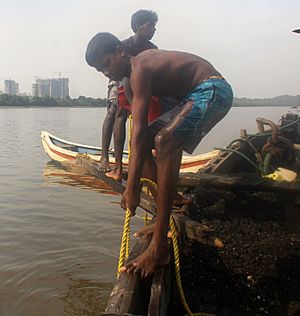Manual labour facts for kids

Manual labor means doing work using your own body, especially your hands and muscles. It's about physical effort, not just thinking or planning. When someone does manual labor, they use their strength and skill to complete tasks. This type of work is very important in many different jobs around the world.
For example, a farmer planting seeds or a construction worker building a house are both doing manual labor. Even crushing grapes by walking on them is a form of manual labor! It's different from jobs where people mostly use machines, animals, or their minds to solve problems.
Contents
What is Manual Labor?
Manual labor involves using your physical strength and skills. It's about getting things done with your hands, arms, legs, and back. Think of it as "hands-on" work.
Physical Work and Effort
This kind of work requires energy and often involves moving things. It can be tiring because it uses your muscles a lot. People who do manual labor often need to be strong and fit. They might lift heavy objects or stand for long periods.
Skills Used in Manual Labor
Even though it's physical, manual labor often needs special skills. A carpenter uses their hands to cut and shape wood precisely. A gardener knows how to plant and care for plants. These skills are learned over time and are very valuable.
Where Do We See Manual Labor?
Manual labor is all around us, even in our modern world. Many essential jobs rely on people doing physical work.
In Construction and Building
When new buildings are made, or roads are paved, manual labor is key. Workers dig foundations, lay bricks, and carry materials. They use tools like shovels, hammers, and saws. This work helps create the places we live and travel.
In Farming and Agriculture
Farmers often do a lot of manual labor. They plant crops, harvest fruits and vegetables, and care for animals. This can involve working in fields, picking produce by hand, or milking cows. Manual labor helps bring food to our tables.
In Factories and Manufacturing
Many products we use every day are made with manual labor. In factories, people assemble parts, pack goods, and operate machines. They use their hands to put things together carefully. This work helps create clothes, electronics, and toys.
In Services and Maintenance
Think about people who clean parks or collect trash. These jobs involve a lot of manual effort. Gardeners, cleaners, and repair people all use their physical skills. They help keep our communities tidy and working well.
The Importance of Manual Labor
Manual labor has always been a big part of human history. Before machines were invented, almost all work was done by hand. Today, even with lots of technology, manual labor is still very important.
Building Our World
From ancient pyramids to modern skyscrapers, manual labor built our world. It's the foundation of our cities and infrastructure. Without people willing to do physical work, many things we rely on wouldn't exist.
Supporting Our Lives
Manual labor helps produce our food, build our homes, and keep our environment clean. It's essential for our daily lives. Many jobs that seem simple are actually very important for society to function.
Working with Machines
Even with machines, people are still needed for manual tasks. Someone has to operate the machine, load materials, or fix it if it breaks. Manual labor and technology often work together.
Challenges in Manual Labor
While important, manual labor can sometimes have challenges. It can be physically demanding and sometimes dangerous.
Safety and Health
Workers need to be careful to avoid injuries. They often wear safety gear like hard hats or gloves. It's important that workplaces are safe and that workers get enough rest.
Fair Treatment
Sometimes, people doing manual labor, especially in poorer areas, might not be treated fairly. This can include working long hours for very little pay. In some sad cases, children are forced to do manual labor, which is called child labour. This is wrong because children should be in school and playing, not working in dangerous conditions.
Images for kids
-
Peasants harvesting crops, by Flemish artist Pieter Brueghel, 17th century
-
Rail track construction, Kansas, USA, 1974
-
Road construction by women in Myanmar, (2019)
 | Claudette Colvin |
 | Myrlie Evers-Williams |
 | Alberta Odell Jones |






